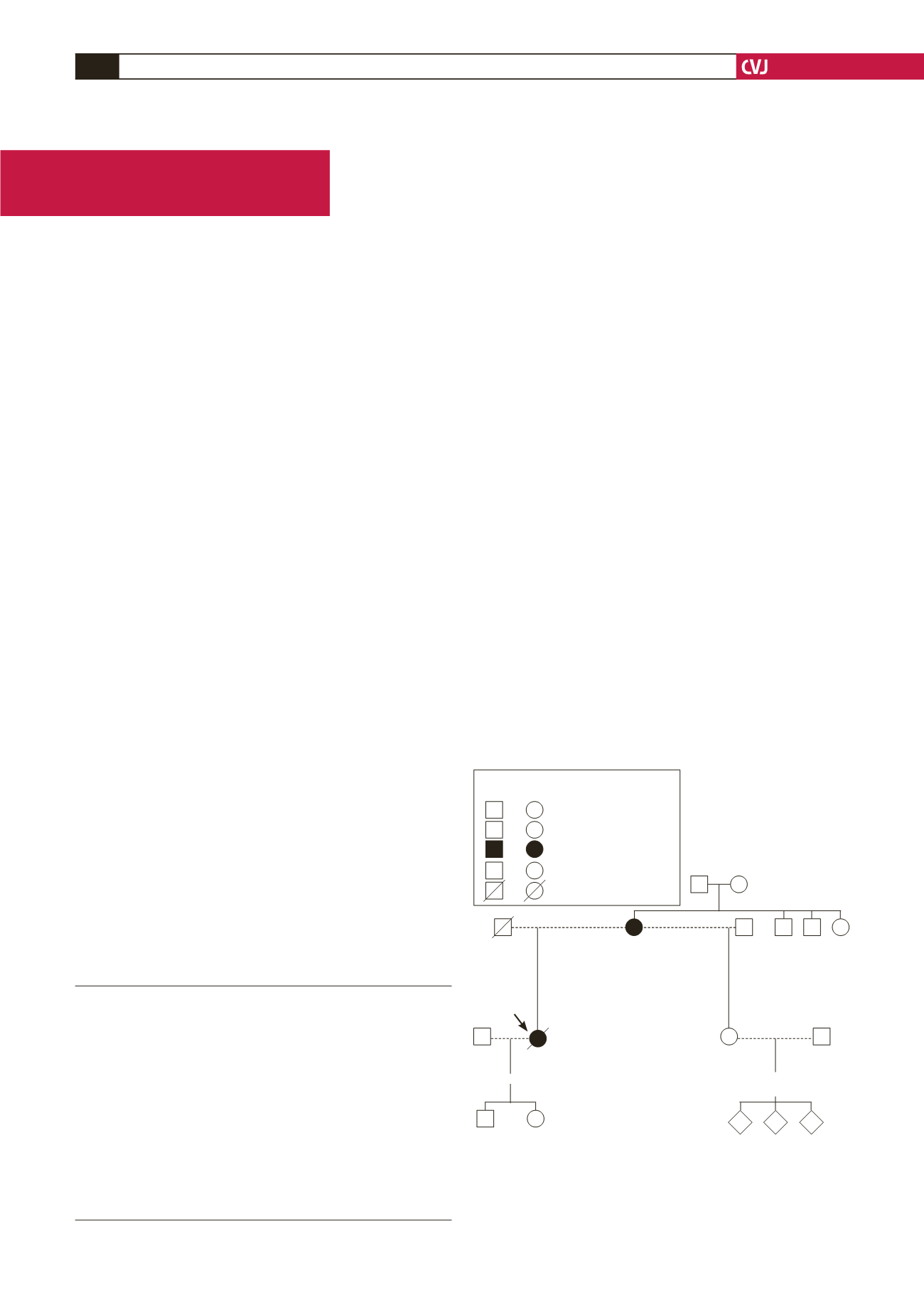
CARDIOVASCULAR JOURNAL OF AFRICA • Vol 24, No 5, June 2013
e4
AFRICA
Case Report
Peripartum cardiomyopathy and familial dilated
cardiomyopathy: a tale of two cases
K TIBAZARWA, K SLIWA, A WONKAM, BM MAYOSI
Abstract
Peripartum cardiomyopathy (PPCM) is a form of pregnancy-
related heart failure that is associated with considerable
morbidity and mortality. Most patients present with acute
postpartal heart failure that otherwise resembles the clini-
cal presentation of dilated cardiomyopathy (DCM). There
is increasing recognition that PPCM may be due to genetic
factors in a significant proportion of cases. There is evidence
that at least 7% of cases of PPCM may be part of the spec-
trum of familial DCM. We report on two cases of PPCM,
with relatives demonstrating familial DCM, both patients
displaying autosomal dominant patterns of inheritance, and
showing severe cardiomyopathy among proband and affected
relatives. Family screening for familial DCM should be indi-
cated in all cases of unexplained PPCM.
Keywords:
peripartum cardiomyopathy, genetics, familial dilat-
ed cardiomyopathy, Africa
Submitted 29/11/12, accepted 17/4/13
Cardiovasc J Afr
2013;
24
: e4–e7
DOI: 10.5830/CVJA-2013-027
Peripartum cardiomyopathy (PPCM) causes heart failure in
women of child-bearing age. We describe two African patients
with PPCM, diagnosed according to standard criteria,
1
who
underwent comprehensive screening of first-degree relatives
and were found to have familial disease. Informed consent was
obtained from both patients and the study protocol conformed
to the ethical guidelines of the 2008 Declaration of Helsinki
as reflected in
a priori
approval by the human research ethics
committee of the University of Cape Town.
Case report 1
A 22-year-old mother of two presented 27 days postpartum with
one week of symptoms and was diagnosed with PPCM. Despite
treatment, she died at home within six months. Family screening
found her mother to have asymptomatic dilated cardiomyopathy
(DCM)
(Fig. 1).
After opting for conservative management, the mother
developed symptomatic DCM a year later, presenting in florid
heart failure. Cardiac catheterisation and other investigations
excluded coronary artery disease (CAD). The index case’s
half-sister admitted to a history of dizziness, low blood
pressure and occasional fainting episodes in crowds but had no
echocardiographic evidence of DCM.
Case report 2
A 23-year-old mother of two presented two months postpartum
with PPCM. Family history revealed an unspecified heart
condition in her mother, who died shortly after a cerebro-
vascular accident at age 60 years (Fig. 2). Her sister apparently
developed heart failure four years after her first delivery at 19
Hatter Institute for Cardiovascular Research in Africa,
Department of Medicine, University of Cape Town, Cape
Town, South Africa
K TIBAZARWA, MD,
K SLIWA, MD, PhD
Division of Human Genetics, University of Cape Town,
South Africa
A WONKAM, MD
Hatter Institute for Cardiovascular Research in Africa,
Department of Medicine and the Institute of Infectious
Disease and Molecular Medicine, Groote Schuur Hospital
and University of Cape Town, Cape Town, South Africa
BM MAYOSI, D Phil, FCP (SA)
Legend
Males Females
Not screened, or no
known features of DCM
N N
Screened normal
Affected with DCM
? ?
Possibly affected from
verbal history
Deceased
II:5
Died:
Non-cardiac
illness
II:4
53 yrs
Screened; found affected but
asymptomatic. All other clinical
parameters were normal. Chose
conservative management. One year
later developed symptoms of DCM.
II:6
II:1
II:2
II:3
40 yrs
I:1 I:2
III:2
IV:1
4 yrs
IV:5
3 yrs
III:5
IV:2 IV:4 IV:3
NB. Dotted lines imply partners that never married
Fig. 1. Pedigree of index case (arrowed) with peripartum
cardiomyopathy with familial disease (Family I). (DCM,
dilated cardiomyopathy)
N
N N
N
III:4
33 yrs
Admits previous fainting twice
in crowded places; told BP low
III:1
22 yrs
Presented postpartum


